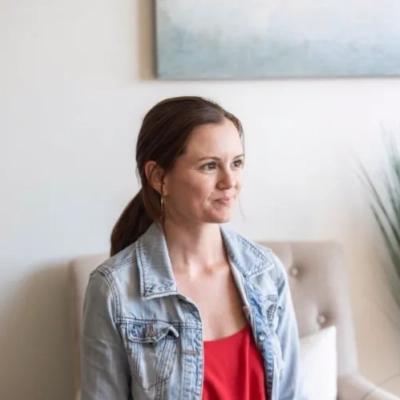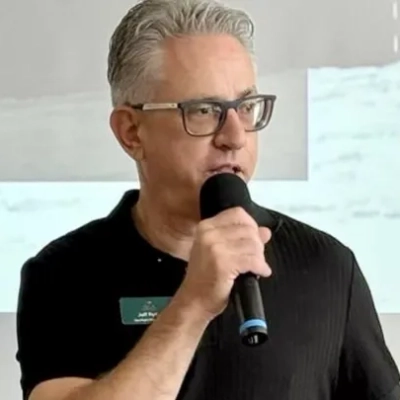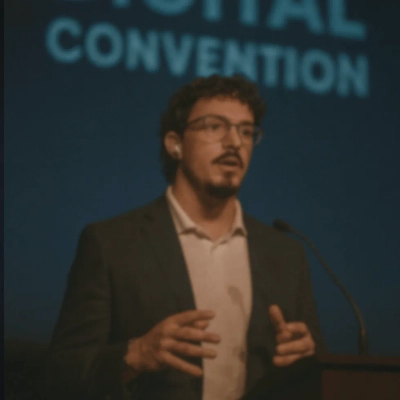Creative Ways Entrepreneurs Give Back: Strengthening Support Networks
Entrepreneurs are constantly seeking innovative ways to support their communities and peers. This article explores fifteen creative strategies for giving back and strengthening support networks within the entrepreneurial ecosystem. Drawing on insights from industry experts, these approaches offer practical and impactful methods for fostering collaboration and growth.
- Host a Collaborative PR Sprint
- Organize an Authentic Failure Night
- Create a Real-Time Support Network
- Build a Specialized Resource Vault
- Facilitate Informal Brand Jam Sessions
- Arrange a Vulnerable Failure Roundtable
- Offer Free Growth Audit Sessions
- Design Custom-Branded Event Apparel
- Launch a Niche Compliance Roundtable
- Coordinate Talent Exchange Roundtables
- Advocate Through Social Media Platforms
- Conduct Focused Feedback Huddles
- Share Franchise Insights and Connections
- Structure Confidential Peer Advisory Sessions
- Foster Open Knowledge Sharing Networks
Host a Collaborative PR Sprint
Last fall, I hosted a free Quarterly Visibility Sprint exclusively for 12 members of my FemFounder mastermind group. I sent each founder a one-page PR pitch in advance. Then, over a two-hour Zoom session, we rotated into small breakout rooms, where I led 5-minute PRISM Micro-Sprints to refine their hooks, storylines, and next-step tactics. After the live event, I compiled all our collective insights — plus mini case studies from each founder — into a co-branded e-book and distributed it to everyone’s email lists, so each participant walked away not only with sharper pitches but also with a fresh reach into each other’s audiences.
That act of giving back did more than elevate everyone’s media strategies; it solidified my role as a partner in their success. Founders who had experienced my frameworks firsthand started referring ideal clients, inviting me onto their podcasts, and collaborating on joint workshops — all without me asking. By investing my proprietary tools and time freely, I deepened trust, unlocked new cross-promotional opportunities, and turned a simple workshop into an ever-expanding network of advocates.
 Kristin Marquet
Kristin Marquet
Founder & Creative Director, Marquet Media
Organize an Authentic Failure Night
A few years ago, after a particularly intense fundraising sprint with several startups, I realized how disconnected many founders were from each other — even though they were dealing with the same challenges. So I hosted an off-the-record “failure night” at a small bar in Berlin. No pitch decks, no bravado — just raw stories about what hadn’t worked. I kicked it off with a story about how I once bombed a pitch because I’d misjudged the investor’s expectations and over-hyped the valuation. It broke the ice.
That night, people connected in a genuine way — not because they needed something, but because they finally saw each other without the armor. Several of those connections turned into founder partnerships, co-investments, and even hiring opportunities. What surprised me was how many of them later referred startups to us, saying they trusted us more because we weren’t afraid to talk about the difficult aspects. I didn’t plan it as a business development tactic — it was just human — but it paid back tenfold in trust and goodwill.
 Niclas Schlopsna
Niclas Schlopsna
Managing Consultant and CEO, spectup
Create a Real-Time Support Network
As someone who has coached hundreds of therapists and built multiple revenue streams, I learned that the most impactful giving happens when you solve problems before people ask.
I created a private Voxer group for my former one-on-one coaching clients where they can get quick advice on business decisions, celebrate wins, and troubleshoot challenges in real-time. Instead of ending our relationship after three months, I maintain ongoing connections at no cost. This group now has 47 members who actively refer clients to each other and collaborate on projects.
One member was struggling to fill her eating disorder group program last year. Within hours of posting in our Voxer group, three other therapists had referred appropriate clients, and her program launched successfully at full capacity. That same therapist later referred two high-value clients to my one-on-one coaching program.
The unexpected benefit is how this group became my best market research. When I launched my course for the ninth time, I already knew exactly what obstacles my ideal clients faced because I’d been solving them in real-time for months. My conversion rate jumped 28% compared to previous launches.
 Danielle Swimm
Danielle Swimm
Consultant, Entrepreneurial Therapist
Build a Specialized Resource Vault
One of my most rewarding acts of reciprocity was creating a comprehensive SEO resource vault specifically for my fellow Wix Partners in the service industry. After eight years of building successful campaigns, I compiled our proprietary keyword research methods, conversion optimization templates, and local SEO checklists into a free resource shared exclusively through partner channels.
The impact was immediate and measurable. A Denver HVAC contractor I’d mentored through this program saw his organic leads jump 40% in three months using our local landing page templates. When I later needed specialized CRM integration expertise for a major client project, he connected me with a software developer who became instrumental in streamlining our lead generation systems.
This knowledge sharing created unexpected business opportunities beyond just goodwill. Two partners I’d helped with SEO strategies later referred high-value clients to us, including a hair restoration clinic that became one of our anchor accounts generating $8,000+ monthly recurring revenue.
The beauty was watching these relationships compound naturally. Partners started cross-referencing each other for specialized services, creating a tight-knit network where everyone’s expertise lifted the group’s collective success rate with difficult client challenges.
 Jeff Ryder
Jeff Ryder
Co-Owner, Spotlight Media 360
Facilitate Informal Brand Jam Sessions
One of the best ways I’ve given back to my entrepreneurial circle was by hosting informal “brand jam” sessions. We’d grab coffee, sit around a table, and throw ideas back and forth — no pressure, no PowerPoints, just honest conversations about what’s working and what’s not. I’d share my branding expertise, but the real value came from the mix of perspectives in the room.
These meetups always left people buzzing with ideas they could implement immediately, but more importantly, they helped us genuinely get to know each other. When you sit down, swap stories, and help solve real problems together, you build trust effortlessly. Over time, those simple conversations have led to collaborations, referrals, and friendships that feel far more authentic than anything you could get from a formal networking event.
 Kevin Connor
Kevin Connor
CEO, Modern SBC
Arrange a Vulnerable Failure Roundtable
One creative way I’ve given back to my entrepreneurial support network was by organizing a private Failure Roundtable — a no-pitch, no-promo Zoom session where a small group of founders could share their biggest flop or misstep they’d made that year. I reached out to people who’d helped me through tough moments, and instead of offering advice or surface-level wins, we all showed up with honesty and context about what didn’t work—bad hires, failed launches, and burned-out quarters.
What made it powerful was the vulnerability. No one was performing. We laughed, cringed, and offered perspective, but mostly just held space for the real stuff that doesn’t make it into LinkedIn posts. That level of authenticity created a deeper bond than any networking event ever could.
It strengthened relationships because it broke down the facade. We weren’t just peers — we were allies. And that kind of trust has turned into ongoing support, better collaboration, and a reminder that giving back doesn’t always mean mentorship or introductions. Sometimes, it’s just making room for others to feel seen without judgment.
 Patric Edwards
Patric Edwards
Founder & Principal Software Architect, Cirrus Bridge
Offer Free Growth Audit Sessions
One creative way we’ve given back to our entrepreneurial support network is by hosting free “growth audit” sessions for early-stage founders in our space. We invited members of our network to bring their websites, campaigns, or brand messaging to a live session where our team provided real-time feedback, shared tools, and offered actionable insights they could implement immediately.
What made it effective was that it wasn’t just a one-way value exchange — it created a space for open dialogue, idea-sharing, and collaboration. Founders left with useful takeaways, and we often gained fresh perspectives from their questions and challenges. It also helped us spot upcoming talent and ideas we might not have encountered otherwise.
These sessions naturally sparked follow-up conversations and deeper relationships. Some founders later became clients, partners, or long-term collaborators. More importantly, it demonstrated that we weren’t just here to take — we were genuinely invested in helping others grow. That kind of authentic support strengthens your network far more than transactional favors. It creates a culture where people want to give back, share knowledge, and open doors for each other.
 Phillip Young
Phillip Young
CEO, Bird SEO Agency UK
Design Custom-Branded Event Apparel
One creative way I’ve given back to my entrepreneurial support network is by designing and gifting custom-branded T-shirts for fellow founders’ events and product launches.
Instead of generic swag, I personally talk with my team and suggest that they take time to create comfortable, personalized apparel for my entrepreneurial support network.
This thoughtful gesture not only helps them promote their business in style but also shows genuine support. It’s become a meaningful way to celebrate milestones together, sparking conversations and deepening trust.
This act of reciprocity has strengthened relationships by turning simple giveaways into lasting symbols of mutual encouragement and collaboration. It reminds me that success is sweeter when we uplift each other in tangible, personalized ways.
 Nir Appelton
Nir Appelton
CEO, Adorb Custom Tees
Launch a Niche Compliance Roundtable
One creative way I’ve given back to my entrepreneurial support network — particularly within the merchant of record (MoR) ecosystem — was by launching a compliance and revenue optimization roundtable exclusively for early-stage digital commerce founders. Rather than offering a generic networking session, this initiative was designed to tackle a recurring blind spot: navigating tax compliance, fraud risks, and payment settlements while scaling globally.
Having worked closely with multiple merchants who rely on MoR platforms to simplify cross-border sales, I noticed that many founders lacked strategic understanding of how MoR services could be leveraged beyond basic compliance — such as for improving conversion rates, minimizing chargebacks, or optimizing VAT structures. I invited a mix of operators, MoR specialists, and tax advisors for a closed-door, solution-oriented discussion, where each participant could share their challenges and get direct, actionable input.
In one instance, a founder expanding into the EU was unaware of how MoR could streamline their VAT registration and reduce cart abandonment due to pricing inconsistencies. After the session, they restructured their checkout flow and saw a 12% lift in international conversions within six weeks.
This act of reciprocity significantly strengthened relationships across my network — not only because I facilitated learning, but because I created a space where founders felt safe discussing operational pain points. It positioned me as a connector, not just a consultant, and deepened mutual trust with both peers and partners.
Key Tip: Give back by solving hidden pain points in your niche — especially where regulation and revenue intersect. Insight is currency in the MoR world.
 Garrett Lehman
Garrett Lehman
Co-Founder, Gapp Group
Coordinate Talent Exchange Roundtables
If you’re looking for ways to give back to your entrepreneurial network, start by thinking about what unique skills or knowledge you can offer that others in your network might not possess. I’ll give an example of a way that I give back.
A couple of times a year, I host “talent exchange” roundtables for fellow business owners and agency leaders. These small, invite-only sessions allow participants to share roles they’ve struggled to fill or refer high-quality candidates they couldn’t hire due to budget, location, or timing, connecting talent with trusted peers who might have the right fit.
I act as facilitator and moderator, making introductions, keeping the conversation moving, and ensuring follow-ups happen afterward. The goal isn’t to generate business for myself but to create a shared hiring ecosystem where we solve each other’s staffing challenges.
This approach has strengthened relationships in powerful ways. It shows I value my network’s success as much as my own, building trust and goodwill. Participants leave with tangible results, from securing key hires to saving weeks of search time, and I’ve become known as a connector in my industry, which keeps my firm top of mind when someone does need help with a search.
 Steve Faulkner
Steve Faulkner
Founder & Chief Recruiter, Spencer James Group
Advocate Through Social Media Platforms
One creative approach I’ve taken to give back to my entrepreneurial support network is through dedicated social media advocacy. I regularly feature small and local businesses on my Instagram platform by posting authentic reviews and visually appealing content that showcases their products or services. By intentionally tagging these businesses and adding thoughtful commentary, I help connect them with my audience, potentially introducing them to new customers they might not otherwise reach.
This digital support costs nothing but time and attention, yet provides meaningful visibility for fellow entrepreneurs who are working to establish their market presence. The relationships built through this consistent support have evolved into genuine partnerships, with many business owners expressing how much they value this form of recognition. What began as simple posts has developed into a community of mutual support where we actively look for opportunities to elevate each other’s work.
 Raphael Larouche
Raphael Larouche
Founder & SEO Specialist, Agence SEO Zenith
Conduct Focused Feedback Huddles
One of the best ways I’ve given back to my founder network is by hosting small “feedback huddles.”
A few of us get on a call to review each other’s landing pages or product ideas and share honest feedback.
No selling, no pitching — just helping each other improve.
These simple sessions have built stronger relationships than any networking event.
When people know you’re helping without expecting anything, trust builds naturally.
Trust doesn’t ask for favors; it earns them.
Over time, those same founders became collaborators, referrals, and friends who had my back when it mattered most.
 Mohit Ramani
Mohit Ramani
CEO & CTO, Empyreal Infotech Pvt. Ltd.
Share Franchise Insights and Connections
One way I’ve given back is by helping early-stage founders in franchising avoid the mistakes we made early on. I’ve shared internal workflows, joined working sessions, and connected them with people who can help move their businesses forward.
That kind of support builds real trust. Over time, it’s led to strong relationships and new opportunities rooted in shared experience and mutual respect.
 Alex Smereczniak
Alex Smereczniak
Co-Founder & CEO, Franzy
Structure Confidential Peer Advisory Sessions
One of the most meaningful ways I have given back to my entrepreneurial support network is by structuring confidential peer advisory sessions. As someone who has navigated digital transformation and led global e-commerce teams for over two decades, I have seen firsthand how isolating leadership can become, especially when scaling or facing disruption. Early in my consulting career, I noticed that many high-level leaders lacked a safe forum to discuss operational setbacks or test bold ideas without risking credibility in their own organizations.
To address this, I initiated private roundtable sessions, limited to a handful of founders and senior executives from non-competing sectors. The format is simple: each participant brings a current challenge, and the group provides candid, experience-based feedback rooted in operational reality. I facilitate to keep discussions focused and actionable, drawing on my own experience with omnichannel pivots, performance marketing, and integrating emerging technologies like AI into legacy systems. These sessions are not about giving advice in the abstract, but about sharing what actually worked — or failed — in practice.
What made this approach powerful was its balance of trust and practical value. By being transparent about my own mistakes and lessons from major e-commerce rollouts or digital restructurings, I encouraged others to move beyond surface-level updates and dig into the real operational and leadership dilemmas they faced. This spirit of mutual vulnerability and expertise-sharing quickly set a new tone in my network. It led to deeper collaborations, referrals, and ongoing mentorship relationships that extended well beyond the sessions themselves.
Reciprocity, in my view, is not just about returning favors but about elevating the collective intelligence and resilience of the network you rely on. By creating a space for honest, strategic dialogue, I strengthened not only my relationships but also the ecosystem that supports sustainable business growth. The most valuable connections in my career have always been those built on shared challenges and mutual accountability, not transactional exchanges. This approach continues to shape how I mentor leaders and guide companies through the complex realities of digital transformation.
 Eugene Mischenko
Eugene Mischenko
President, E-Commerce & Digital Marketing Association
Foster Open Knowledge Sharing Networks
Here in Texas, I’ve been part of a quiet but meaningful shift toward more collaborative entrepreneurial networks, and it’s been one of the most rewarding parts of my career. I think this instinct comes with time and confidence; I have no interest in engaging in petty competitiveness or guarding so-called trade secrets. I’ve seen firsthand that a rising tide lifts all boats, and I do my best to practice open, honest information sharing across my entire business network. Anyone with good intentions is welcome at the table.
There’s no posturing, no ego, no games — just peers exchanging real, unfiltered knowledge. In my experience, generosity beats secrecy every time, especially in an industry like recruiting where word-of-mouth matters and your reputation is your brand.
And the impact has been profound. This approach has fostered deep mutual respect, consistent referrals, and long-term friendships. When entrepreneurs can be real with each other, everyone benefits, because everyone becomes a resource.
 Jim Hickey
Jim Hickey
President, Perpetual Talent Solutions

